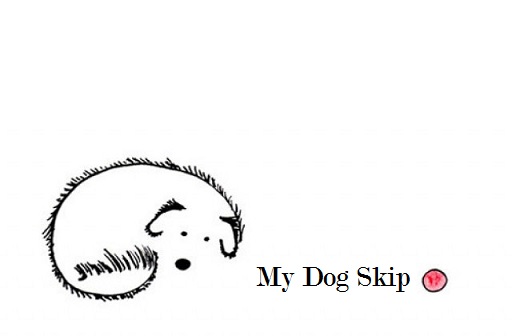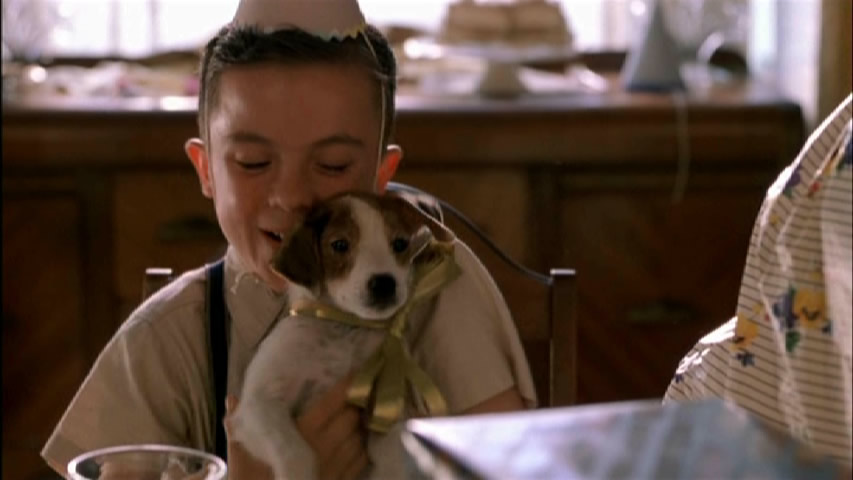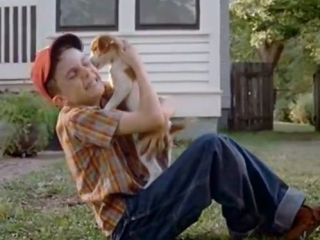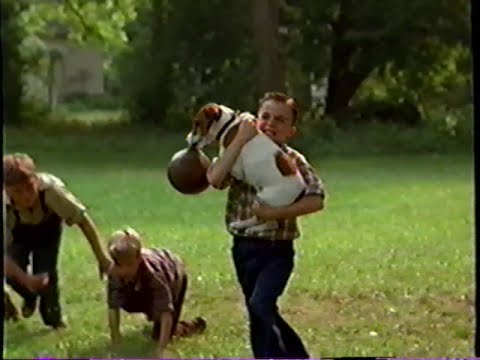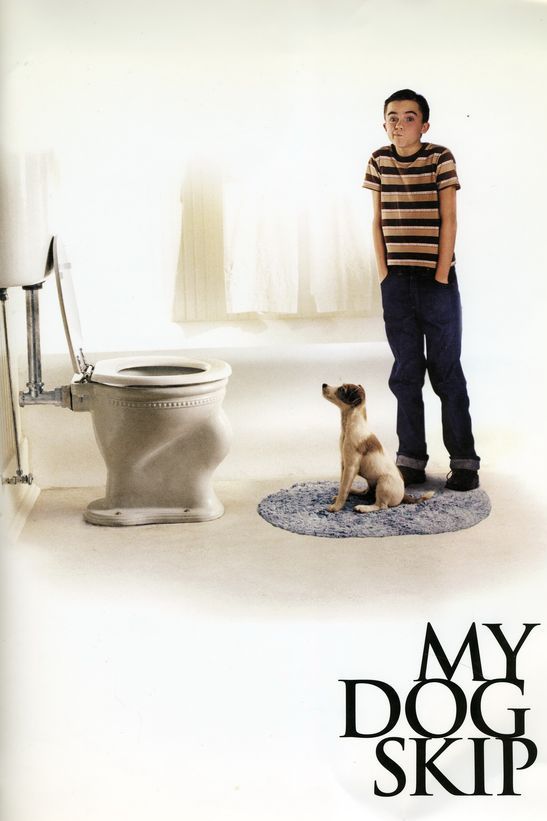My Dog Skip is a true story based on the early life of Willie Morris and his pet dog, Skip. The film is narrated by that of an older Willie Morris, reminiscing on those early memories that have become so precious to him. Before Skip is introduced into the Morris’ lives, Willie lacks friends, especially those his own age, and is often the victim of bullying. He also has a tense relationship with his father who has suffered an injury in the war, an injury that has led to him becoming stern and morose. However, with Skip coming into their lives, Willie gains confidence and, through Skip’s antics, he begins to make friends. Skip becomes a celebrated and much loved part of town-life in Yazoo, Mississippi, as well-known and respected as the local baseball stars. Though, it is his effect on Willie that is the most beautiful to watch.
The film is adapted from Willie Morris’ autobiographical novel, of the same title as the film, detailing the famous author and editor’s childhood memories centred around his pet dog. My Dog Skip is largely a family film; while it is appropriate for younger viewers, it appeals to all ages. The relatively simple plot allows for deeper threads of meaning to be placed at various points throughout the film, disguised or diluted by the easy relatability of having had a pet as a child. This ‘litter of points to make’ concerns issues of racial discrimination, stigmas and stereotyping, the importance of friendship and loyalty, and nonviolence towards others and animals. [1] Although, in many regards, some of these serious issues are merely glanced at without exploring them in greater depth. [2] Potentially, it is because this is an autobiographical tale, narrated by the protagonist when they are older and reflective, but told through his perspective as a child. Ignorant, then, of that which does not affect him or hasn’t been made aware to him. However, this will be discussed in greater depth, in terms of Skip being a shared connection between the divided races. In addition to being a family film, the film can also be said to be a coming-of-age tale for it illustrates the emotional and personal development Willie undergoes in terms of his maturity and his loyalty towards others. But what is interesting to note is that this is only possible through the encouragement and actions of Skip.
Initially, Ellen Morris’ decision to gift her son a puppy for his 9th birthday is a point of contention between her and her husband, Jack, who believes Willie too young for a dog that is a ‘heartbreak waiting to happen’. [3] This heartbreak, he explains, stems from dogs often being the victims of car accidents, when the dog dies, gets sick or runs away from home; however, those examples of heartbreak are capable of happening to anyone, human or animal alike. [4] Perhaps Jack’s bitter, pessimistic perspective on having his son own a pet is knowing the responsibility that accompanies having something/someone depend on you, a responsibility he undoubtedly felt towards providing for his family during the war and with a disability. The sad potentialities that Jack lists as being associated with domesticated animals, and moreover, the shorter lifespan of most domesticated animals in relation to their human owners, could be symbolic of the shorter lifespan of those that experience and live through war.
During a montage after Willie discovers that his parents have allowed him to keep the puppy, the narrator describes how he and Skip were more alike than one would think of a human and an animal. Both ‘scared and shy’, both an ‘only’ to the Morris family as an ‘only child’ and an ‘only dog’, this loneliness prompted the beginning of their bond for Skip had been deprived of his canine family and Willie deprived of any friendship. [5] The use of a whimpering, adorable Jack Russell Terrier puppy would have the same effect on an audience as it had on Willie, in that it is difficult to resist the instinct to become attached to something so visually, and aurally, vulnerable. Therefore, it becomes relatively easy for the filmmakers to manipulate the audience’s emotions from thereon as an audience is instinctually drawn to something so innocent, just as they are compelled to root for Willie for he is also an innocent child subjected to bullying and the upsets and bitterness of his father.
The relationship of domesticated animals to their owners has often been perceived as one of dependence, however this is not true of the relationship of Skip and Willie on screen, theirs is of co-dependence. The montage, just after Willie has Skip returned to him as a puppy, demonstrates Willie caring for Skip as one would their own child; he marks on a doorjamb how tall Skip has grown and describes Skip’s love for him in terms that are recognizable as a child’s love for its parents, unconditional. [6] However, after this instance, it’s very clear that Skip becomes that parental figure in Willie’s stead. Stepping in to alleviate any embarrassment Willie feels at playing poorly in football, in front of people who largely intimidate him, leading to Willie winning in a game his father has always denied him playing, is just one instance of many where Skip protects Willie as a parent would do. Therefore, in this film, domesticated animals are shown to have a substantial effect on the development of humans; Skip is the parental encouragement towards social and emotional progress that Willie so needed in the early scenes of the film.
Skip is shown to be wholly accepted into Yazoo’s community by all walks of life as the vast abundance of welcomes he receives from various members of the town are testament to, as well as him being able to navigate the streets alone to reach the butchers so, that he can receive a free sample of meat. This illustrates a freedom from the socio-political constricts that plague humans i.e. him being able to walk freely into segregated neighbourhoods and be a friend of both; the commonality between divided racial classes. Therefore, Skip has been presented as an idealised, imagined future beyond that period of discrimination and hatred; a ‘colour-blind’ individual who sees all people with the same regard as he would another. Whilst Willie is that slow progress towards that hoped-for future, for he does enter that neighbourhood in order to call back Skip when he has wandered, as well as befriending Sammy, the young boy who returns his football to him when Willie throws the ball too far during a game of fetch. [7]
Animal violence is presented as a resolutely negative concept, as well as just violence in general in the film, for its treatment of a wild deer’s death by hunters and when Willie hits Skip in anger during a baseball game. Jack, Willie and Skip are witness to a deer dying in front of them, during a walk in their local woods, due to hunters shooting it to use the deer for meat. Melancholic piano music accompanies the scene and groans and heavy breaths can be heard as the deer lays on the forest floor, making it appear as though these are the deer’s last attempts at life, although the animal noises were actually created by the sound department and not the deer. [8] All three watching, including Skip, are entranced by the death they are witnessing. Willie was particularly distressed at seeing harm inflicted on an animal and asks his father to take it to a vet for she is still living before the hunters reach her. [9] Paired with the dialogue prior to the deer entering the scene, when father and son were talking about the war and its casualties and heartbreaks, the death of the deer seems to be symbolic of the deaths in war: just an innocent creature that is made to suffer a ‘necessary’, unavoidable harm. This is made more prevalent with the addition of slow piano music as it creates an atmosphere of tragic events having taken place rather than presenting it as an animal having been killed for practical purposes (for meat), something that is common in the society we live in.
However, the Hunters do joke over their killing of the deer to Jack, talking of him coming ‘round for some venison pie’, despite the obvious upset vocalised by Willie. [10] Jack has been so affected by what he endured in the Spanish Civil War, and Dink later divulges that the agony of war is in the killing, and yet, to the adults in this scene, the death of an innocent animal is not given the same weight as killing a human because they gain something from it. Although, if one considers the deer’s death as being symbolic of the death of innocence, it makes sense that the adults have a less powerful reaction than Willie as the rite of passage of becoming less innocent and naïve is one they have already experienced. [11] Moreover, it becomes even more hypocritical when one compares this scene to that of Willie lashing out at Skip during a baseball game where Willie is playing poorly. The reaction of the crowd watching the game mimics that of the audience, a protective instinct towards Skip, who was only trying to help alleviate Willie’s discomfiture, and disappointment in Willie that he should act so base. [12] It challenges how a society can protect and defend one animal and not all just because that one animal has had an emotional impact on their lives like Skip has had for many people in Yazoo.
‘Even when Skip was asleep on the operating table, he was still teaching me.’ [13]
To conclude, Skip becomes a prime example of animals being presented as having capabilities beyond what was before imagined. Though this tale has definitely exaggerated truths and included aspects that were not in the original book, nor what we expect really happened, what is undeniable is that Skip was so profound a figure in Willie Morris’ life that he chose to write an entire novel based on his childhood memories of him despite all that Willie achieved in life. Skip presented domesticated animals as being vehicles of greater emotional intelligence for Skip became a ‘teacher’ to Willie, one that allowed him to grow into maturity especially during a time when his parents seemed less involved or rather less able to get involved. Moreover, Skip didn’t just teach Willie valuable lessons in loyalty, friendship and co-operation but, during this turbulent time where racial tensions are still rife, he taught the audience to remain ‘colour-blind’ and respectful of all. Therefore, animals in this film become vehicles in which to communicate and discuss difficult topics under the veil of being a child-friendly, easy-watch.
Bibliography
- ‘American Humane Association: – “No Animals Were Harmed”: My Dog Skip’, Humane Hollywood, < http://humanehollywood.org/index.php/movie-archive/item/my-dog-skip>, (Accessed 13th January 2017)
- Ebert, Roger, ‘Reviews: My Dog Skip’, Roger Ebert, (2000) http://www.rogerebert.com/reviews/my-dog-skip-2000, (Last Accessed 10th January 2017)
- Mandell, Zack, ‘Americana Movie Month: “My Dog Skip” Review’, MRR: Movie Room Reviews, (2013), < http://www.movieroomreviews.com/reviews/americana-movie-month-my-dog-skip-review>, (Accessed 13th February 2017)
- My Dog Skip, Dir. Jay Russell, 2000
- Smithouser, Bob, ‘My Dog Skip’, PluggedIn, <http://www.pluggedin.com/movie-reviews/mydogskip/>, (Accessed 11 January 2017)
Further Reading/Video Materials
- Adriana Miyuki Koza, ‘My Dog Skip -Last Scene’, Youtube, https://www.youtube.com/watch?v=CjX7QJwzp-U, (Accessed 13th January 2017)
- Jonathan Burt, Animals In Film, (London: Reaktion Books, 2002)
- Richard Grey, ‘Dogs as intelligent as two-year-old children’, The Telegraph, (2009), http://www.telegraph.co.uk/news/science/science-news/5994583/Dogs-as-intelligent-as-two-year-old-children.html, (Accessed 14th January 2017)
[1] Bob Smithouser, ‘My Dog Skip’, PluggedIn, <http://www.pluggedin.com/movie-reviews/mydogskip/>, (Accessed 11 January 2017), para. 3
[2] Zack Mandell, ‘Americana Movie Month: “My Dog Skip” Review’, MRR: Movie Room Reviews, (2013), http://www.movieroomreviews.com/reviews/americana-movie-month-my-dog-skip-review, (Accessed 13th February 2017), para. 3
[3] My Dog Skip, Dir. Jay Russell, Warner Bros., 2000, 16:45-17:01 min.
[4] My Dog Skip, Dir. Jay Russell, 16:45-17:01
[5] My Dog Skip, Dir. Jay Russell, 18:40-50
[6] My Dog Skip, Dir. Jay Russell
[7] My Dog Skip, Dir. Jay Russell
[8] ‘American Humane Association: – “No Animals Were Harmed”: My Dog Skip’, Humane Hollywood, http://humanehollywood.org/index.php/movie-archive/item/my-dog-skip, (Accessed 13th January 2017), para. 5
[9] My Dog Skip, Dir. Jay Russell
[10] My Dog Skip, Dir. Jay Russell
[11] Roger Ebert, ‘Reviews: My Dog Skip’, Roger Ebert, http://www.rogerebert.com/reviews/my-dog-skip-2000, (Last Accessed 10th January 2017), para. 7
[12] Roger Ebert, ‘Reviews: My Dog Skip’, Roger Ebert, http://www.rogerebert.com/reviews/my-dog-skip-2000, (Last Accessed 10th January 2017), para. 5
[13] My Dog Skip, Dir. Jay Russell, 1:24:43
